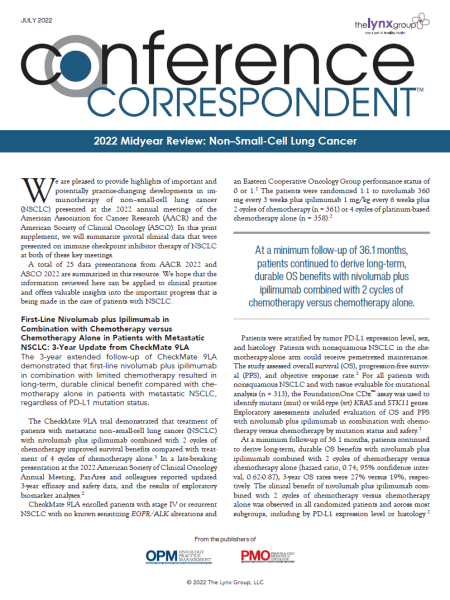For patients with a variety of oncogene-driven cancers, therapies targeting specific aberrant signaling pathways have resulted in clinically meaningful outcomes. Pairing certain tumors with an appropriate targeted therapy has proven effective in treating unique mutations and rearrangements driving chronic myeloid leukemia, melanomas, and non–small-cell lung cancer (NSCLC).1 When comparing targeted therapy for these specific cancers with standard-of-care cytotoxic chemotherapy regimens, objective response rates and progression-free survival (PFS) were improved.1 These improvements demonstrate the benefit of targeted therapy and highlight the importance of identifying the underlying molecular mechanism (and the specific biomarker) to optimize treatment.2,3
Compared with other cancers, lung cancer has a significant rate of genetic alterations.4 In NSCLC, there are several oncogenic driver mutations that are actionable for treatment. Approximately 20% of patients with NSCLC have a somatic activating mutation in EGFR, and these patients can be treated with EGFR tyrosine kinase inhibitors. Doing so results in longer PFS compared with platinum-based chemotherapy treatment.2 Of patients with metastatic NSCLC, approximately 5% have gene rearrangements that result in fusions and lead to overexpression of the protein anaplastic lymphoma kinase (ALK).2 In addition, chromosomal rearrangements in the gene encoding ROS1 are present in approximately 1% of patients with NSCLC, while somatic activating BRAF mutations are present in 1% to 2% of patients with lung adenocarcinoma.2 Although responses vary, molecularly targeted approaches have resulted in positive outcomes for patients with NSCLC with these oncogenic drivers.2 Additional molecular alterations have been identified, including MET exon 14 skipping mutations (approximately 4% of patients with NSCLC), HER2 mutations (approximately 2% of patients with lung cancer), NTRK gene alterations (approximately 1% of NSCLC tumors), and rearrangements in the RET gene (1%-2% of patients with NSCLC).2,5
Treatment of targets for which specific inhibitors are not available (such as MET, RET, and HER2) with medications approved for other diseases or molecular alterations has resulted in modest success.2 Multikinase inhibitors have been studied for use in patients with RET-driven tumors; however, the efficacy of this treatment is limited, potentially because the therapy also inhibits non-RET kinases.1 As such, drug development and clinical trials are ongoing for specific therapies to target these oncogenic drivers.2
Molecular profiling can identify appropriate targeted therapies or clinical trials for patients with NSCLC.4 In fact, the College of American Pathologists (CAP), the International Association for the Study of Lung Cancer (IASLC), and the Association for Molecular Pathology (AMP) jointly issued guidelines recommending molecular testing of patients with lung cancer for EGFR mutations and ALK gene fusions in 2013.6 In 2018, these guidelines were updated to include a recommendation for molecular identification of ROS1 gene rearrangements.7 The American Society of Clinical Oncology concurred with the 2018 CAP/IASLC/AMP guidelines for the treatment of patients with lung cancer with targeted tyrosine kinase inhibitors, but added a recommendation to screen for BRAF mutations.8
Regardless of these recommendations, there has been variable uptake of biomarker testing and molecular profiling in clinical practice.9 In 2018, it was estimated that EGFR testing rates were approximately 72% for newly diagnosed patients with NSCLC, and ALK testing was done for approximately 69% of patients. The same survey revealed approximately 38% of patients are screened for ROS1 rearrangements, 16% of patients are screened for HER2 mutations, and only 14% of patients are screened for RET rearrangements.10 Although barriers exist to molecular testing, some can be overcome with the advent of next-generation sequencing–based assays that will allow for a complete molecular profile, evaluating all proven and emerging biomarkers in one test with a single sample.9 Increasing molecular profiling can optimize NSCLC treatment and improve outcomes for patients, but the uptake in clinical practice, especially in the community, needs to be improved.7
References
- Drilon A, Hu ZI, Lai GGY, Tan DSW. Targeting RET-driven cancers: lessons from evolving preclinical and clinical landscapes. Nat Rev Clin Oncol. 2018;15:151-167.
- Arbour KC, Riely GJ. Systemic therapy for locally advanced and metastatic non–small-cell lung cancer: a review. JAMA. 2019;322:764-774.
- Kris MG, Johnson BE, Berry LD, et al. Using multiplexed assays of oncogenic drivers in lung cancers to select targeted drugs. JAMA. 2014;311:1998-2006.
- Barlesi F, Mazieres J, Merlio JP, et al; for the Biomarkers France contributors. Routine molecular profiling of patients with advanced non–small-cell lung cancer: results of a 1-year nationwide programme of the French Cooperative Thoracic Intergroup (IFCT). Lancet. 2016;387:1415-1426.
- Mayekar MK, Bivona TG. Current landscape of targeted therapy in lung cancer. Clin Pharmacol Ther. 2017;102:757-764.
- Lindeman NI, Cagle PT, Beasley MB, et al. Molecular testing guideline for selection of lung cancer patients for EGFR and ALK tyrosine kinase inhibitors: guideline from the College of American Pathologists, International Association of the Study of Lung Cancer, and the Association for Molecular Pathology. Arch Pathol Lab Med. 2013;137:828-860. Erratum in: Arch Pathol Lab Med. 2013;137:1174.
- Lindeman NI, Cagle PT, Aisner DL, et al. Updated molecular testing guideline for the selection of lung cancer patients for treatment with targeted tyrosine kinase inhibitors: guideline from the College of American Pathologists, the International Association for the Study of Lung Cancer, and the Association for Molecular Pathology. Arch Pathol Lab Med. 2018;142:321-346.
- Kalmkerian GP, Narula N, Kennedy EB, et al. Molecular testing guideline for the selection of patients with lung cancer for treatment with targeted tyrosine kinase inhibitors: American Society of Clinical Oncology endorsement of the College of American Pathologists/International Association for the Study of Lung Cancer/Association for Molecular Pathology clinical practice guideline update. J Clin Oncol. 2018;36:911-919.
- Pennell NA, Arcila ME, Gandara DR, West H. Biomarker testing for patients with advanced non–small-cell lung cancer: real-world issues and tough choices. Am Soc Clin Oncol Educ Book. 2019;39:531-542.
- Audibert CM, Shea MB, Glass DJ, et al. Trends in the molecular diagnosis of lung cancer: results from an online market research survey. July 20, 2017. www.focr.org/sites/default/files/pdf/FINAL%202017%20Friends%20NSCLC%20White%20Paper.pdf. Accessed September 11, 2020.

